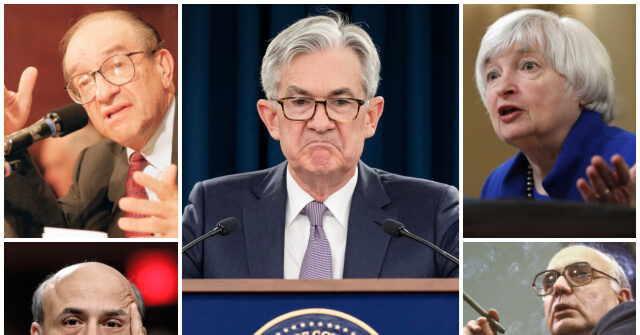Breitbart Business Digest: Powell Wins the Fed Unpopularity Contest
Jerome Powell, the No Confidence Man Every unpopular Federal Reserve chairman is unpopular in his own way.

A Gallup poll released Tuesday showed that confidence in Jerome Powell to undertake or recommend the right policies for the U.S. economy has continued to plunge. Just 36 percent of Americans say they have a “great deal” or a “fair amount” of confidence in Powell’s leadership at the Fed, down 43 percent a year ago and the lowest confidence level recorded by Gallup in polls going back to 2001. This puts Powell below the previous lows hit by his immediate predecessors. Ben Bernanke’s worst score on the Gallup confidence survey was 38 percent in 2012. Janet Yellen’s was 38 percent in 2016. Alan Greenspan’s worst was 56 percent in 2005, although you have to wonder if Bernanke’s 2006 score of 41 percent might be a result of people not quite having caught on to the fact that Greenspan had vacated the office a few months earlier. Bernanke’s low popularity in the spring of 2012 can probably be chalked up to the disappointing economy of the prior year.
The post-financial crisis recovery had stalled out and gross domestic product grew just 1.7 percent. Final demand, which excludes the volatile inventories, grew just 0.8 in the final quarter of 2011. Real disposable personal income rose at only a 0.8 percent rate after adjusting for inflation.
The S&P 500 was flat for the year. From left to right: former Federal Reserve Chairs Alan Greenspan, Ben Bernanke, and Janet Yellen (John Duricka, J. Scott Applewhite, Carolyn Kaster/AP Photo) Yellen’s low came at the end of the tenure of President Barack Obama in the volatile atmosphere that, several months later, helped elect Donald Trump.
The prior year had seen a dramatic slowdown in growth.
The annualized rate of growth went from nearly 3.8 percent in the first quarter down to 1.9 in the fourth quarter.
The S&P 500 fell 0.73 percent in 2015. Neither Bernanke nor Yellen ever inspired much public confidence. Bernanke peaked at 50 percent in 2007. Janet Yellen peaked at 45 percent a decade later. By contrast, Jerome Powell saw confidence in his leadership rise from 45 percent in the first year he held the post to 58 percent by 2020. While it might seem odd that confidence in Powell peaked in the pandemic year, keep in mind that the economy was doing very well prior to the pandemic. Powell has steadily lost the public’s confidence each year since.
The obvious reason for this is inflation. He was very publicly wrong on inflation when he insisted that inflation was driven by “transitory” factors. Under his watch, inflation rose to the highest levels in four decades, forcing the Fed to raise rates at the fastest clip since the Fed started targeting the federal funds rate. We should also note the dismal performance of the stock market last year. Although the Fed is not charged with keeping equities afloat and the stock market is not the economy, stock prices do reflect expectations about corporate profits and, less directly, economic growth.
The performance of the stock market also feeds back into the public’s perception of economic health. So, last year’s 19 percent plunge in the S&P likely weighed on the public’s confidence in Powell’s economic stewardship. Interestingly, there doesn’t seem to be much correlation at all with unemployment. In each of the years in which a Fed chair hit his or her confidence nadir, unemployment was falling.
The public does not seem to give much credit to Fed chairs when it comes to the employment side of the central bank’s famous dual mandate. Of course, we do not elect Fed chairs to preserve their popularity. In fact, we do not elect them at all.
They are appointed to four-year terms that intentionally cross presidential regimes so that they can afford to be unpopular. No doubt Powell is able to find some comfort in the fact that one of the most unpopular—probably the most unpopular—Fed leaders ever is now lauded as its finest. That would be Paul Volcker. As Fed chairman, he appeared to wear his unpopularity as a point of pride. Or, perhaps more accurately, he wore his willingness to withstand the slings and arrows of outraged popular opinions as a sign of fortitude. In his time, he was unpopular with two presidents, Congress, and the broader public. Today, he is regarded as the man who beat inflation and restored the Federal Reserve’s credibility. Federal Reserve Chairman Paul Volcker at a hearing on Capitol Hill. (Diana Walker/Getty Images) It seemed pretty clear from Powell’s last press conference that he would like the Fed to put further interest rate hikes on pause at the next meeting of the Federal Open Market Committee on June 13 and 14. It remains to be seen whether the economic data will accommodate this desire.
The April jobs numbers certainly showed no trend toward a softening labor market. In particular, unemployment fell, wage growth ticked up, and job gains were higher than expected. This was the first of what will be only a handful of significant macroeconomic indicators before the June meeting.
The next will be out tomorrow morning, when the Department of Labor releases its report on the consumer price index (CPI).
The market expects a 0.4 percent month-on-month rise for both headline and core CPI.
The annual figure is expected to come in at five percent for headline and 5.5 percent for core. One reason to be wary that these could be an underestimation is that the Cleveland Fed’s nowcast of inflation is running hotter. It has headline CPI at 0.61 percent month over month and monthly core at 0.46 percent. This gives it year-over-year figures of 5.19 percent headline and 5.56 percent core.
Read the full article at the original website
References:
